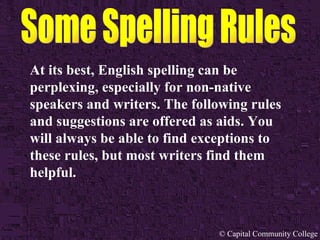
Spelling
- 1. At its best, English spelling can be perplexing, especially for non-native speakers and writers. The following rules and suggestions are offered as aids. You will always be able to find exceptions to these rules, but most writers find them helpful.
- 2. i before e , except after c . . . . ach ie ve, bel ie ve, b ie r, br ie f, hyg ie ne, gr ie f, th ie f, fr ie nd, gr ie ve, ch ie f, f ie nd, pat ie nce, p ie rce, pr ie st c ei ling, con c ei ve, de c ei ve, per c ei ve, re c ei pt, re c ei ve, de c ei t, con c ei t . . . and in words that rhyme with hay. . . n ei ghbor, fr ei ght, b ei ge, sl ei gh, w ei ght, v ei n, and w ei gh . . . and some other exceptions. . . . ei ther, n ei ther, f ei nt, for ei gn, forf ei t, h ei ght, l ei sure, w ei rd, s ei ze
- 3. A f inal y changes to i when an ending is added . supply becomes suppl ies worry becomes worr ied merry becomes merr ier . . . except when that ending is -ing . . . cr ying , stud ying . . . And when the y is preceded by a vowel. . . . ob eyed , s aying
- 4. A silent e is dropped when adding an ending that begins with a vowel . . . advance + -ing = advancing surprise + -ing = surprising . . . but kept when the ending begins with a consonant . . . advance ment , like ness . . . unless the e is preceded by a vowel. . . . argue + -ment = argument true + -ly = truly
- 5. Adding a prefix seldom changes the spelling of a word. mis spelled un necessary dis satisfied dis interested mis inform
- 6. We form plurals in English by adding -s or -es . shoe s porch es box es bush es blitz es For words ending in a consonant plus -y , change the -y to -i and add -es . For proper nouns, keep the -y . toy s compani es Kennedy s
- 7. When adding an ending to a word that ends in a consonant, we double that consonant when the ending begins with a vowel and the last syllable of the word is accented and that syllable ends in a single vowel followed by a single consonant. Now that’s a mouthful! Let’s look at some examples. . . .
- 8. ADMIT + -ed = ADMITTED When adding an ending to a word that ends in a consonant, we double that consonant when the ending begins with a vowel and the last syllable of the word is accented and that syllable ends in a single vowel followed by a single consonant. ADMIT is accented on the last syllable and the final consonant is preceded by a vowel, so we double the t before adding, for instance, an -ing or -ed : admitting, admitted.
- 9. FLAP + -ed = FLAPPED When adding an ending to a word that ends in a consonant, we double that consonant when the ending begins with a vowel and the last syllable of the word is accented and that syllable ends in a single vowel followed by a single consonant. FLAP contains only one syllable, which means that syllable has to be accented. The final consonant is preceded by a vowel, so we double that final consonant: flapped, flapping.
- 10. COUNSEL + -ing = COUNSELING When adding an ending to a word that ends in a consonant, we double that consonant when the ending begins with a vowel and the last syllable of the word is accented and that syllable ends in a single vowel followed by a single consonant. COUNSEL contains two syllables and the final consonant is preceded by a vowel, but the word is accented on the first syllable, so we don’t double the consonant before adding an ending.
- 11. BEGIN + -ing = BEGINNING When adding an ending to a word that ends in a consonant, we double that consonant when the ending begins with a vowel and the last syllable of the word is accented and that syllable ends in a single vowel followed by a single consonant. BEGIN contains two syllables and the final consonant is preceded by a vowel, and the word is accented on the last syllable, so we double the consonant before adding an ending: beginner, beginning
- 12. DESPAIR + -ed = DESPAIRED When adding an ending to a word that ends in a consonant, we double that consonant when the ending begins with a vowel and the last syllable of the word is accented and that syllable ends in a single vowel followed by a single consonant. DESPAIR contains two syllables, and the final syllable is accented, but the final consonant is preceded by two vowels, not a single vowel, so we don’t double that final consonant when we add an ending.
- 13. Becoming a better speller is a matter of personal commitment and finding your own method to add this important skill to your writing arsenal. Refer to the Guide to Grammar and Writing for recommendations on working on spelling. Also, take the spelling quizzes on the List of Interactive Quizzes . Good luck!
- 14. This PowerPoint presentation was created by Charles Darling, PhD Professor of English and Webmaster Capital Community College Hartford, Connecticut copyright November 1999